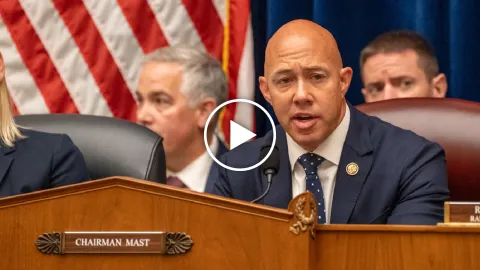Chairman Mast Delivers Opening Remarks at State Department Reauthorization Markup
WASHINGTON, D.C. – Today, House Foreign Affairs Committee Chairman Brian Mast delivered opening remarks during a markup of the panel’s bipartisan, standalone State Department reauthorization.

Remarks
Right now, the department of state, 85% of it is not authorized by Congress. It's not a rounding number; it's an exact calculation. So regardless of the good work that had been done in the past, we have this responsibility to do today.
Between the year 2000 and 2024, the State Department's budget grew from $9.5 billion to more than $55 billion. And we have to ask, where did that money go? And did our foreign policy feel five times better? And what is the accountability that we put onto that massive increase that's taking place within the State Department?
The State Department, for decades, has had a culture of unaccountability because of a structure that did not demand accountability. This authorization is designed to end that. It is designed to restore accountability —accountability to us, the Legislative Branch.
Every state department employee will answer to a single chain of command, whether it's a consular affairs officer processing a passport or a bureau head in Washington overseeing hundreds of direct reports, America will speak with a unified, disciplined and strategic voice abroad. No more rogue diplomats funding transgender musicals and saying that that is soft power. Economic policy will be treated as foreign policy. Economic security will be treated as national security. Every dollar of aid will be overseen by a new undersecretary for foreign assistance.
The State Department will be required to produce a global public diplomacy strategy with hard, hard benchmarks, measurable results and assessments of how we counter our adversaries through the power of diplomacy. International security policy will be driven by results— results-based management, not bureaucracy.
These reforms will give America's diplomats the tools and the flexibility to succeed, but with firm guardrails in place to carry out the president's foreign policy, never their own.
Reform like this has to be open and transparent. And that's exactly how we built out these bills. We tried to empower every single member of this committee, Democrat and Republican, to craft this bill.
For instance, my friend, the Ranking Member from New York wrote the section creating a new Assistant Secretary of State for Energy Security and Diplomacy. Warren Davidson wrote the section creating the Office of Strategic Diplomacy to make sure that dollar reigned supreme. The ranking member of our western hemisphere subcommittee, Congressman Castro, got in language in the bill, creating a new investment screening initiative at the State Department. Representative Jackson wrote the section establishing an Assistant secretary for Commercial Diplomacy. Representative Moskowitz, my fellow Floridian, you got into accountability guidelines for the U.S. Security Coordinator for Israel and Palestinian Authority. Mike Lawler you wrote the provision making it easier for the Bureau of Consular Affairs to hire qualified passport specialists to cut down on backlogs.
That's just a fraction of the 2300 member priorities that were considered for inclusion. And we could go back and forth all day about those provisions coming from all sides of this body. It doesn't even account for the hundreds of amendments that we will be debating in this markup.
When I asked to lead this committee, it was with the promise that we would conduct the first comprehensive, stand-alone State Department reauthorization, or deauthorization, of programs since 2002. We are taking that action today, but this can't be done as a one off. It should be the ambition of all of us to do this, not just every Congress, but every year, moving forward with the same resolve that the National Defense Authorization Act is conducted every year.
This package is a major step forward for the State Department, but it should only be the beginning. In the years ahead, we should bring the same discipline and oversight to the entire foreign policy apparatus, including the U.S. Institute of Peace, the Peace Corps, and every corner of government that spends taxpayer dollars in the name of diplomacy, but maybe does not answer directly to the Secretary of State in the same ways.
America's strength abroad depends on accountability back home. And we are just getting started on that.
###